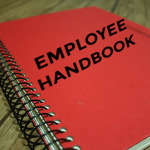Updating Employee Handbooks
By Natalie Lynch
Lynch Service Company
 Employee handbooks contain pivotal information about the business and expectations of employees. Handbooks that contain outdated information may contain illegal provisions or lack best practices. This can expose the business to unnecessary civil liability or a backlash by the public for perceived slights or biases. By reviewing employee handbooks on a regular basis, employers can proactively safeguard their company’s interests.
Employee handbooks contain pivotal information about the business and expectations of employees. Handbooks that contain outdated information may contain illegal provisions or lack best practices. This can expose the business to unnecessary civil liability or a backlash by the public for perceived slights or biases. By reviewing employee handbooks on a regular basis, employers can proactively safeguard their company’s interests.
Importance of Employee Handbooks
Employee handbooks contain important information about the business, including general rules, expectations, and protocol. Employee handbooks establish acceptable behavior and defines unacceptable behavior. These important documents often explain the fundamental policies that the business employs. With clear policies in place, it is more likely that they will be followed. If rules are broken, there is a set plan in place to deal with these issues. If the company is sued, the written contents of the employee handbook may protect the business.
Employee handbooks must be carefully constructed, taking into consideration the company’s industry and other factors specific to the business. While setting out the expectations of the business, an employee handbook can often be most effective as a defensive tool against potential lawsuits from employees or others because it establishes that a particular rule or policy was in effect at the time of some specified event that led to the filing of a complaint. If the company followed its own policies and the employee was aware of these policies, there will be less of an argument in favor of the employee.
Importance of Updating Employee Handbooks
Laws are constantly changing and evolving. It is important that employee handbooks are updated periodically to account for these changes in the law. Additionally, employees must be updated about new policies and changes. In addition to providing employees with a copy of the handbook, employees should also sign an acknowledgement indicating that they received the handbook. It is often recommended that employee handbooks be updated at least on an annual basis. Having a professional periodically review relevant laws and regulations can ensure that only the most current information is included in the handbook. Additionally, reviewing the handbook for clarity can help remove ambiguous language. Like with the original receipt of the handbook, employees should be required to sign an acknowledgment indicating that they are aware of the changes and have received a copy of them.
Provisions Included in Employee Handbooks
Handbooks may contain a variety of different provisions based on the particular needs and considerations of the business. However, some common provisions that are incorporated into these handbooks include:
At-Will Statement
By having an employee handbook, the employer will not want to infer in any way that the handbook takes the employment relationship outside of the at-will framework. This provision may state very simply that an employee can be terminated at any point and for any reason. This statement can help shield the business from claims that the employee can only be terminated for cause.
Disciplinary Procedure
The employee handbook should specify a disciplinary policy. This policy may be progressive in nature, such as increasing the severity of discipline as repeated conduct occurs. By following these procedures closely, the business may be able to shield itself from claims of discrimination. Any disciplinary policy should also make it clear that egregious activity will result in immediate termination.
Attendance Policy
The handbook should also specify the attendance policy. The handbook may state that excessive absences may result in termination. At the same time, the handbook should take care to differentiate between regular absences and absences due to medical purposes to avoid violating any federal or state laws.
Overtime Policy
A policy regarding overtime may also be included in the employee handbook. Any policy should take care to comply with the Fair Labor Standards Act. There may be a requirement for managers to approve before overtime work is performed. To avoid legal liability, the time may be paid, but the employee may be disciplined.
Anti-Discrimination Policy
An anti-discrimination policy is an important component to an employee handbook. The employer may state that it has a zero-tolerance policy for harassment. This policy should outline the process that an employee should follow to report complaints of harassment. The policy may provide examples of harassment and outline the potential disciplinary measures that will be followed in the event of non-compliance.




